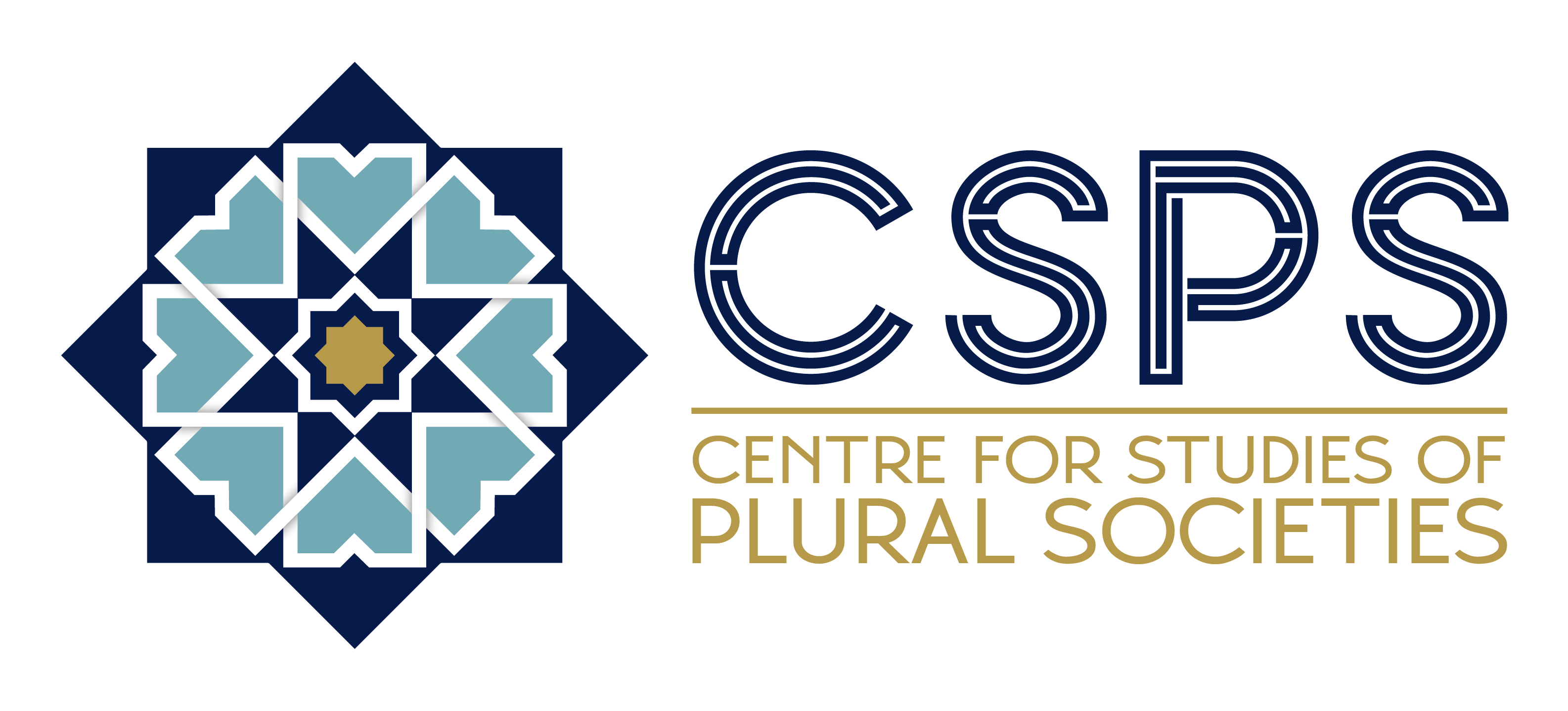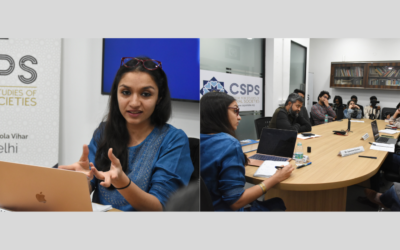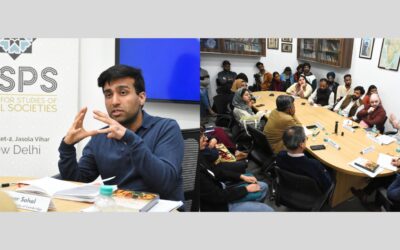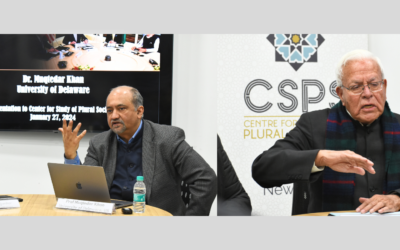The Centre for Studies of Plural Societies (CSPS) organised a webinar on 19th July 2022, titled ‘Prophet Muhammad beyond Islamism’. It was organised to initiate a dialogue amidst the growing controversy around the hateful comments about the Prophet and the violent incidents that followed. The distinguished speakers of the webinar were Prof. Juan Cole (Richard P. Mitchelle Collegiate, Professor of History, University of Michigan) and Dr Shadi Hamid (Senior Fellow, Centre for Middle East Policy, Brookings Institution). The session was chaired by Dr. Manindra Nath Thakur (Assistant Professor, Centre for Political Studies, JNU).
About the Speakers-
Prof. Juan Cole is Richard P. Mitchell, Collegiate Professor of History at the University of Michigan. His most recent book is Muhammad: Prophet of Peace Amid the Clash of Empires. He is also the author of The New Arabs How the Millennial Generation is Changing the Middle East (2014); Engaging the Muslim World (2009); Napoleon’s Egypt Invading the Middle East (2007), and many other books. He has written widely about Egypt, Iran, Iraq, and South Asia. He has written about the Arab world’s upheavals since 2011, including Sunni extremist groups and Shiite politics.
Dr. Shadi Hamid is a senior fellow in the Center for Middle East Policy at Brookings Institution and an Assistant Research Professor of Islamic Studies at Fuller Seminary. He is the author of Islamic Exceptionalism: How the Struggle Over Islam is Reshaping the World (St. Martin,s Press), which was shortlisted for the 2017 Lionel Gelber Prize. He is co-editor with Will McCants of Rethinking Political Islam (Oxford University Press) and co-author of Militants, Criminals, and Warlords: The Challenge of Local Governance in an Age of Disorder (Brookings Institution Press). Dr. Hamid is also a contributing writer at The Atlantic and vice-chair of the Project on Middle East Democracy’s board of directors.
About the Chair-
Dr. Manindra Nath Thakur is an Associate Professor at the Centre of Political Studies at Jawaharlal Nehru University, New Delhi. His area of interest is Social Science Research Methods, Marxist Theory; Indian Politics; Religion and Politics; New Religious Movements.
Commencement of the Session-
The webinar opened with a discussion of pluralism in our society by Dr. Omair Anas, Director (Research) of CSPS. Dr. Anas focused on the need for dialogue among various communities to understand each other in a globalised, complicated, and plural world. Giving a brief introduction about the CSPS and a general overview of the need for such a Centre in the current scenario, Dr. Anas introduced the topic for the webinar- ‘Prophet Muhammad beyond Islamism’. His insights centered around understanding social and international relations more pluralistically. Dr. Anas welcomed the esteemed speakers of the event- Prof. Juan Cole and Dr. Shadi Hamid and extended his heartiest gratitude to them for being a part of this talk. Introducing the chair of the session- Dr. Manindra Nath Thakur, Dr. Anas handed over the command to him.
Dr. Manindra Nath Thakur officially commenced the talk with his insights on the subject. He pointed out the need to talk about religion with a lot of clarity and the need for inter-community dialogue on the idea of religion itself. He stressed the importance of understanding each religion and identifying and addressing our expectations of each other’s religions.
“Should we call it religion? Or should we… somebody said we could never call it in as singular. We must call religion always as religions. They’re all different. There is exceptionalism in every religion.”
Stressing on this point of pluralism in religions, Dr. Thakur talked about the possibilities in every religion- the possibility of being a religion of peace and a religion of violence. With a question of a moral challenge in accessing the peace part of the religion, Dr. Thakur requested Prof. Juan Cole to start with his talk.
Prof. Cole briefed the audience about his work as a person trained in studying religions, where phenomenology and philosophy played a significant part in his becoming a historian later in life. He mentioned how history differs in its approach to seeing things, where texts close to the action are valued more than modern texts. His understanding of Islam is divided between Islamophobia in the west and the extremism of organisations like Al-Qaeda. He started studying Islam by privileging the Quran above any other text, which led him to discover that the extremist mentality projected by all these organisations is a profound betrayal of the ethics of the Quran. Since the Quran is quite explicit, one is not to initiate an aggressive act. Prof. Cole also talked about the pluralistic environment in India and yielded the floor back to Dr. Thakur.
Building on Prof. Cole’s remarks, Dr. Thakur introduced the term ‘fasaad’, which means chaos, anarchy, and people’s problems. He talked about how Islam tried to bring order out of that chaos. Dr. Thakur invited Dr. Shadi Hamid to take the discussion further.
Dr. Hamid began his talk by stressing the importance of dialogue in building relationships between religions. He pointed out how it becomes necessary to listen to the other opinion even if it does not necessarily align with our understanding of the world. Dr. Hamid talked about the life of the Prophet Muhammad and how talking about him becomes challenging because he is not just a rough scripture in history. Instead, we know a lot about him. He also shed light on the other roles that Prophet played during his lifetime- a politician and a state-builder. Dr. Hamid stressed the contextual importance of understanding things- how time and place matter in understanding and judging what is right or wrong. He talked about how war and battle were common during the Prophet’s life; hence, mentioning how to conduct warfare in the Quran is nothing odd.
Dr. Hamid also addressed how Muslims perceive the Prophet. Any remark on the Prophet is perceived as an attack on their selves, which he said is a very modern way of looking at things. Dr. Hamid ended his talk with the idea of Islamism. According to him, Islamism is also a very modern construct and is, in part, a reaction to the introduction of secular ideologies in the contemporary era. He reiterated that we must look very carefully at how political context shapes the interpretation of doctrines.
The lecture followed a question-answer session as Dr. Thakur opened the floor. In the end, both speakers highlight the idea of violence in Islam, the double standard of the world in perceiving Islam, and meanings lost in translations of the Quran. Dr. Thakur concluded the lecture with a poignant point to ponder. He said, “The way we live in a modern, postmodern, or emerging modern world with our commitment to things we love as part of our identity and culture is a big challenge, and that is where probably reinventing is necessary.” Thus, the idea of reinventing dialogue and reading the texts remained the central focal points of the lecture.
The report is prepared by Nawa Fatima, Research Intern at CSPS




